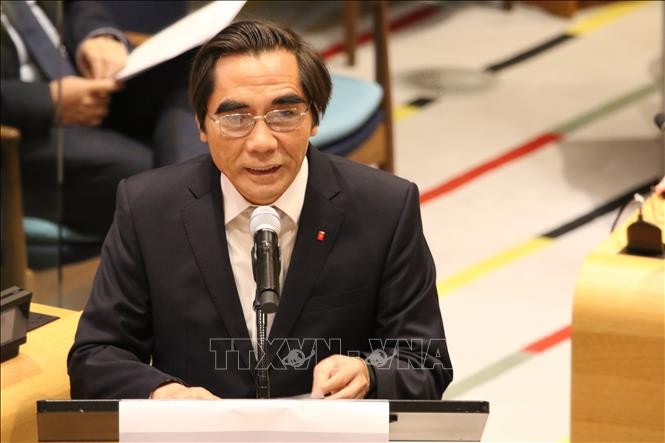(VOVWORLD) - Vietnam shared with the world its experience in implementing Sustainable Development Goals (SDGs) on Wednesday at the 2019 session of United Nations Economic and Social Council (ECOSOC). Vietnam highlighted how the SDGs have been integrated into its national vision for the future.
 Deputy Minister of Planning and Investment Nguyen Van Trung shares Vietnam's experience in implementing Sustainable Development Goals (SDGs) on July 17 at the 2019 session of United Nations Economic and Social Council (ECOSOC) (Photo: VNA) Deputy Minister of Planning and Investment Nguyen Van Trung shares Vietnam's experience in implementing Sustainable Development Goals (SDGs) on July 17 at the 2019 session of United Nations Economic and Social Council (ECOSOC) (Photo: VNA) |
Vietnam’s Sustainable Development Strategy from 2011 to 2020 sets the goals of social advancement, fairness, environmental protection, political and social stability, national independence and unification, and territorial integrity.
Sustainable development progress in Vietnam
Former Deputy Minister of Planning and Investment Le Quang Manh said Vietnam has made progress in achieving SDGs. “Vietnam as a member of the UN has been actively implementing the 2030 Agenda on Sustainable Development. We have adopted a comprehensive and balanced approach, which integrates SDGs into socio-economic development strategies and plans until 2030,” Mr. Manh said.
Vietnam’s economic growth averaged 6.5% following the implementation of SDGs strategy in the past 8 years. Last year, the national economy grew 7.08%, reaching a total 240 billion USD, with GDP per capita at 2.600 USD. Industry and services have increased, while the agriculture sector has reduced. Vietnam spends 20% of its total budget on education. Since 2011, all provinces and cities have met secondary education standards. In 2018, the unemployment rate among people of working age was 2%.
The Gini index, a statistical measure of distribution often used as a gauge of economic inequality, is relatively low compared with other countries in Southeast Asia.
Vietnam is one of the countries that have achieved the most SDGs, six out of eight goals. Last year, the national poverty rate was estimated at 6.8%. Vietnam’s Human Development Index (HDI) – which measures life expectancy, education, and per capita income - was 0.694 in 2017, above of the average level of all 189 countries.
Future orientations
Vietnam seeks rapid economic growth and sustainable development, but does not accept growth at all costs. Its ultimate goal is to settle harmoniously the problem of short and long-term development, and find a balance between rapid and inclusive growth. To this end, Vietnam has announced its own National Sustainable Development Index. Nguyen Bich Lam, head of the General Statistics Office, said: “The National Sustainable Development Index gauges all characteristics of Vietnam’s economy and society. It comprises 158 general goals and 115 specific goals, covering various social aspects like hunger elimination, poverty reduction, and equality. The Index will be references for ministries, sectors, and localities to assess how far they have gone, so that nobody will be left behind.”